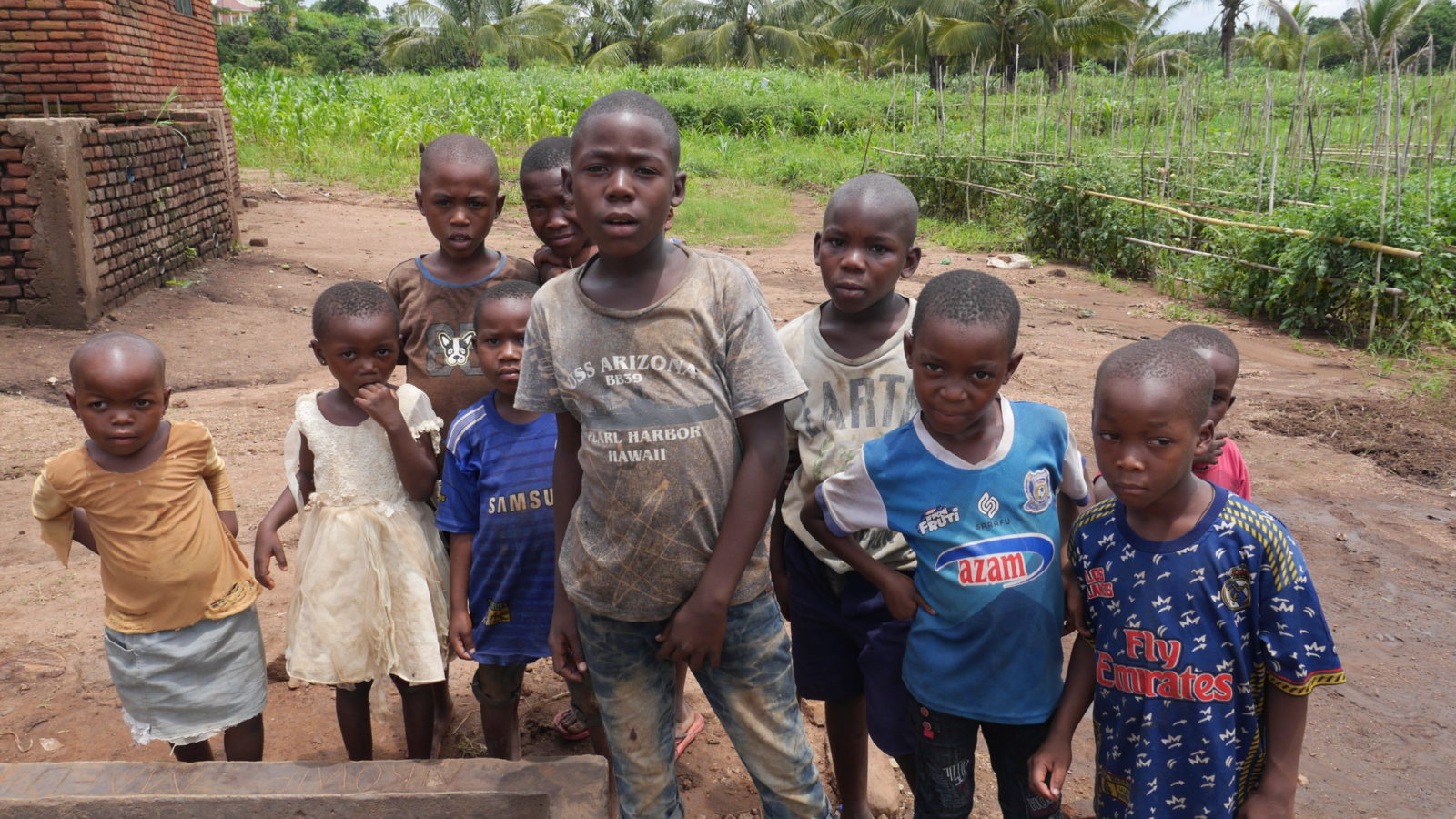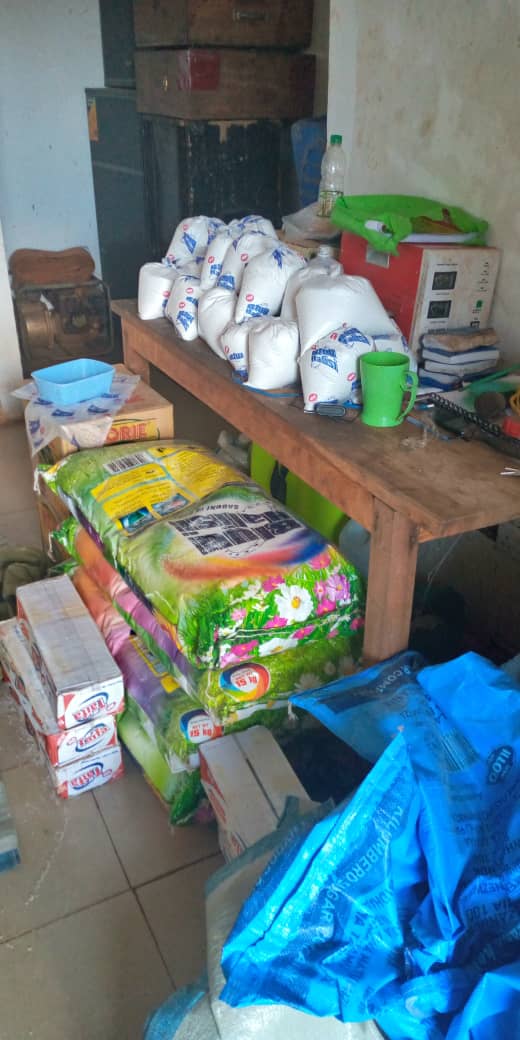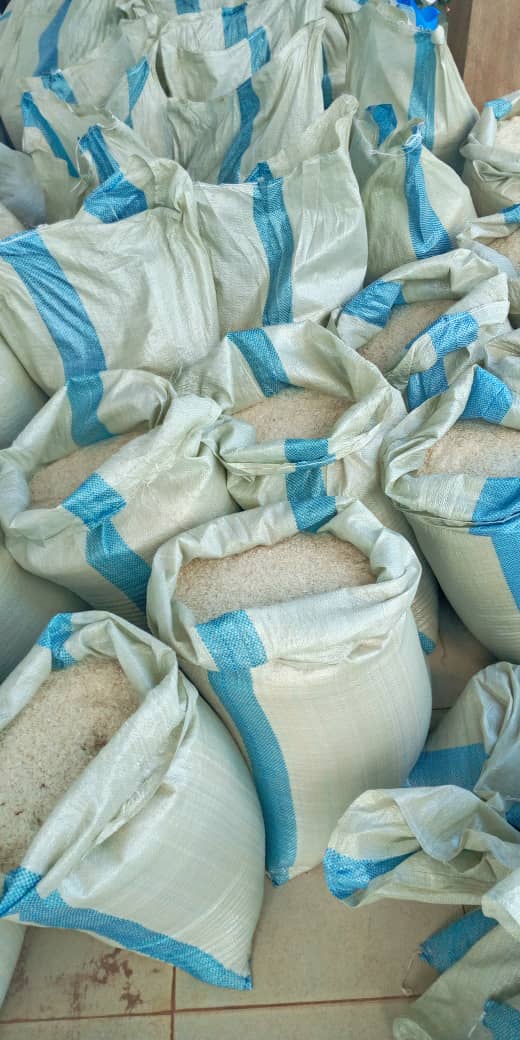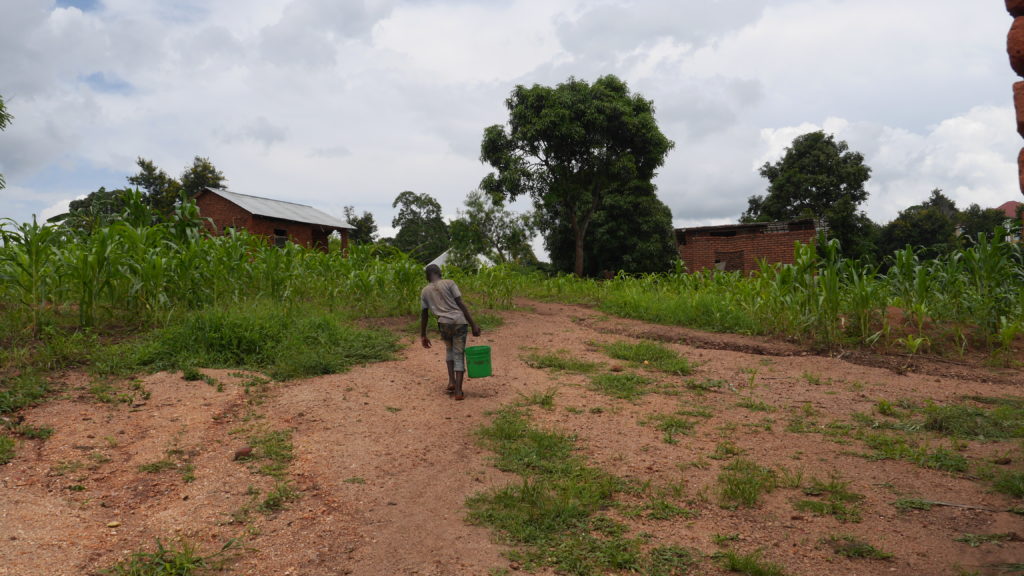
Before clean water arrived at the village of Nkowe-Mafuriko in Tanzania, people would wake up each morning to a life where time, energy and resources were stretched dangerously thin.
Instead of spending precious hours of their day farming the fields for food, villagers would have to wake up while it was still dark to begin their long search for water. Instead of rising to meet each day feeling healthy and strong, the burden of sickness caused by contaminated water would plague them with discomfort.
A 15-year-old girl named Esha recalled the difficulty of life before having access to safe drinking water: “The river we used to collect water from caused stomach aches and diarrhea. I would have to spend time going to the river and if it was the dry season, I would have to dig to find water,” she said.
However, once Global Aid Network (GAiN) provided a deep-capped water well, the hardship of waking up to life in Nkowe-Mafuriko started to disappear. People’s day-to-day rhythms became more sustainable, with less time being consumed by the search for water. Slowly but surely, their physical, mental and spiritual health was restored and rejuvenated.
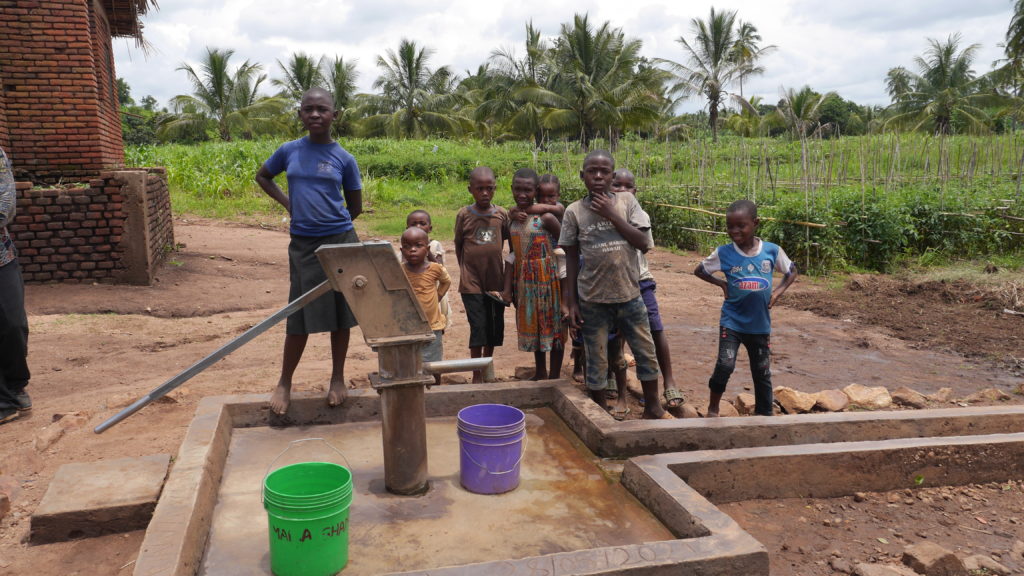
Esha shared how much she loves that the water from the well helps her to keep her home clean, and that she enjoys having clean water to wash her school uniform. Since she is able to attend school, our GAiN team asked Esha what occupation she would like someday and after some thought she said, “I’d like to be a water committee secretary.”
Her answer showed us that she knows the importance of looking after the well and believes it to be a job that women can do. Thanks to GAiN’s water committee training, villagers in Nkowe-Mafuriko are able to be equipped with the tools and knowledge they need to care for the well.
Through a partnership with the closest nearby church (mother church), God’s unconditional love was shared with villagers. Twenty-five members of the village made decisions to follow Jesus, and the three individuals who chose to learn the basics of their faith. However, because this mother church was a 10km walk away from the village, attendance was low. Thanks to a new church plant in the heart of their village, believers can now gather as a Christian community year-round and their numbers are increasing day by day.
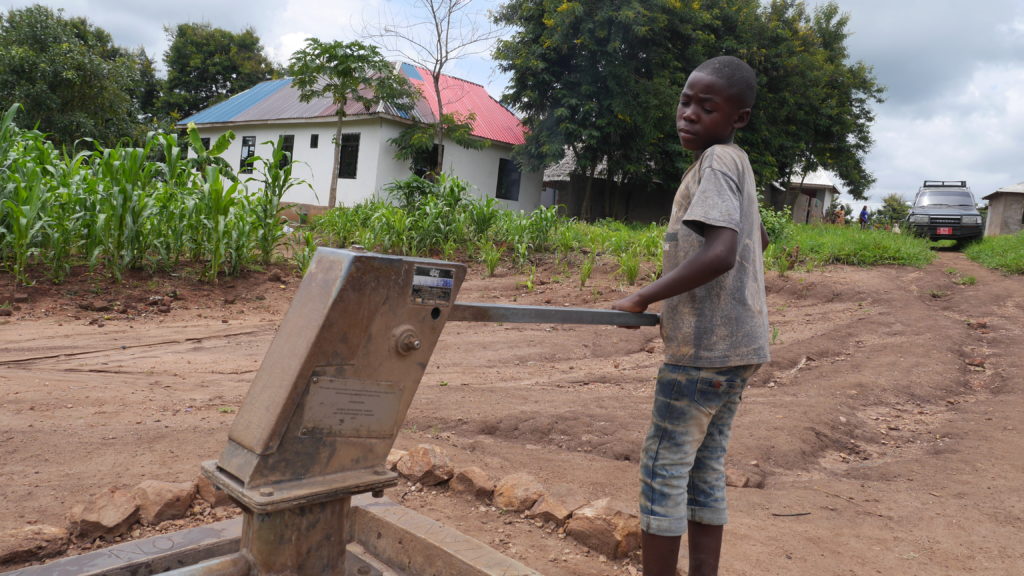
GAiN also built a church structure for this community of believers, which has now grown to 40 adults and many children. Previously, the church met under a tent, which wasn’t comfortable or suitable when it rained.
Through the powerful and transformative gift of having access to clean water, the village of Nkowe-Mafuriko can welcome each new day with joy and hope. Their days are no longer hampered by the time-consuming task of collecting water or the discomfort of water-borne illnesses. They are no longer withheld from attending school or hearing about God’s love through a local church. Each morning, villagers can look forward to a more empowered way of life.
At GAiN, we desire that everyone experience life in its fullness, free from the burden of poverty. Our mission is to reveal hope by sharing God’s unconditional love, and restore life by demonstrating the gospel through compassionate action to those who are living in poverty, injustice and crisis around the world.
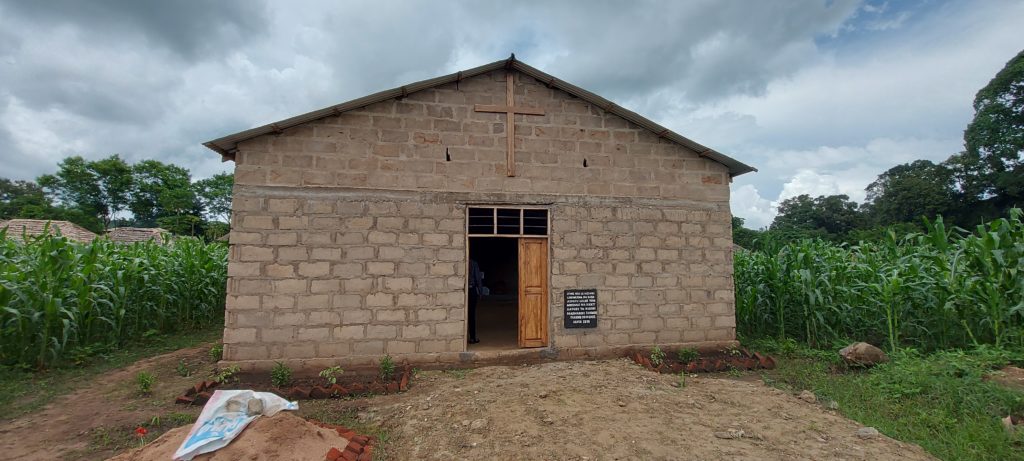
The joint impact of the water well and the sharing of the gospel has infused hope into the life of the villagers. Our dream is to see more individuals experience the body, soul and spirit transformation that comes when safe water and the message of God’s love are introduced into their communities.
Will you join us to help make this dream a reality?
Our goal is to raise $247,250 to provide approximately 23,000 villagers (23 communities) with clean water and the Living Water by June 30th.
A simple ‘yes’ creates a ripple-effect of change in the health, relationships, economy and spiritual vitality of a village. Your gift can serve as the catalyst for authentic and lasting impact on a community for generations to come.
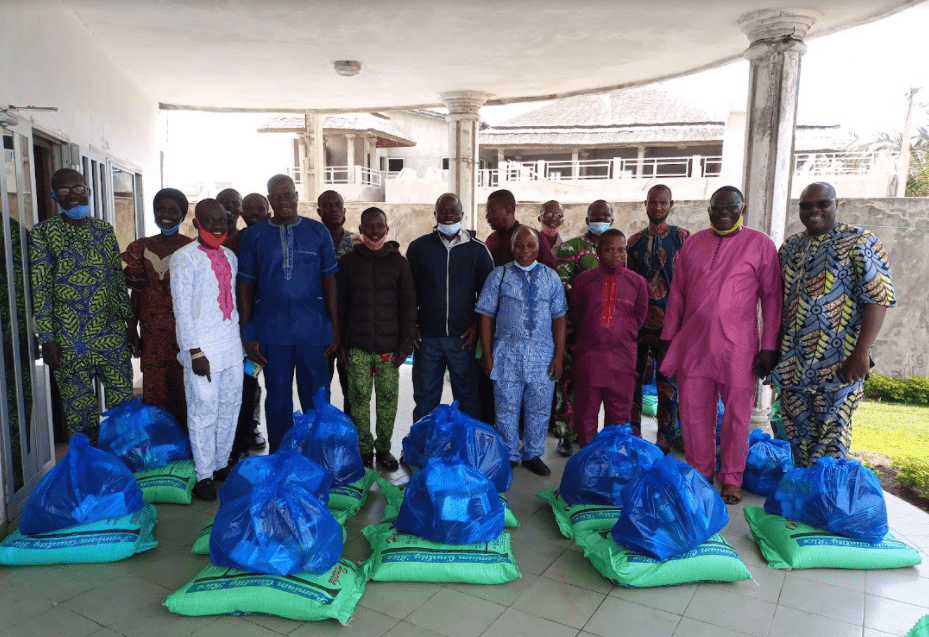
When we started the Pastor Support Program (PSP) last year, we didn’t know that pastors would still be feeling the effects of the COVID-19 pandemic a year later. For pastors like Hountondji Pulcherie in Tori Cada Lokossa 1, Benin, the aid received through the program helped her considerably.
“I thank the donors for everything they are doing because I benefited,” the Foursquare pastor said. “I shared it with some members who had, in the meantime, stopped coming to the church.”
As part of our Water for Life Initiative, the PSP was started in Spring 2020 as a way to support pastors who were having a tough time providing for their families during the pandemic. The pastors we’ve worked with have all previously engaged with GAiN over the years that we’ve been working in Benin and Togo. Government restrictions to help limit the spread of COVID meant that churches could not gather as they used to. Many of the congregants even lost their jobs due to the crisis. Even when some churches were able to partially reopen, some church members simply stopped attending. This has affected the church in different ways, as it hindered doing ministry and resulted in reduced offerings. The negative impact was strongly felt by pastors, as some churches had to cut their pastor’s salaries in half.
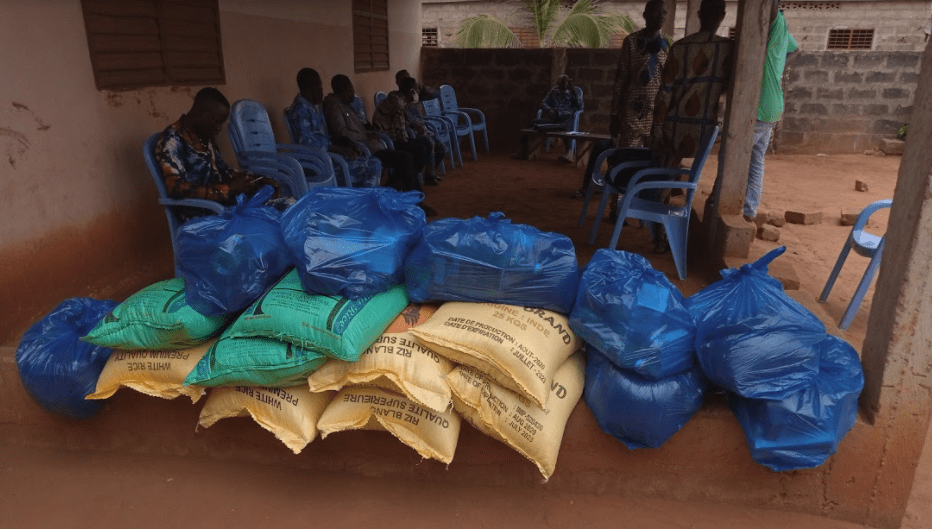
In July 2021, we started phase 2 of the program. The PSP in Benin completed the first of eight distributions in July 2021. Twenty-six pastors each received a bag of rice, beans, oil, soap, and a small gift for their children. Pastors also attended a three-hour workshop at the GAiN Benin office. They received Bridge to Life booklets to assist them in their evangelism and discipleship work.
In Togo, the first distribution happened in early August. The team planned 15 different distribution sites spread throughout the country so that pastors in different areas didn’t have to travel too far to get their packages.
These distributions have been helpful during this season, especially for those who live in areas where Benin and Togo have experienced an extended drought. The drought has led to high food prices and increased food scarcity.
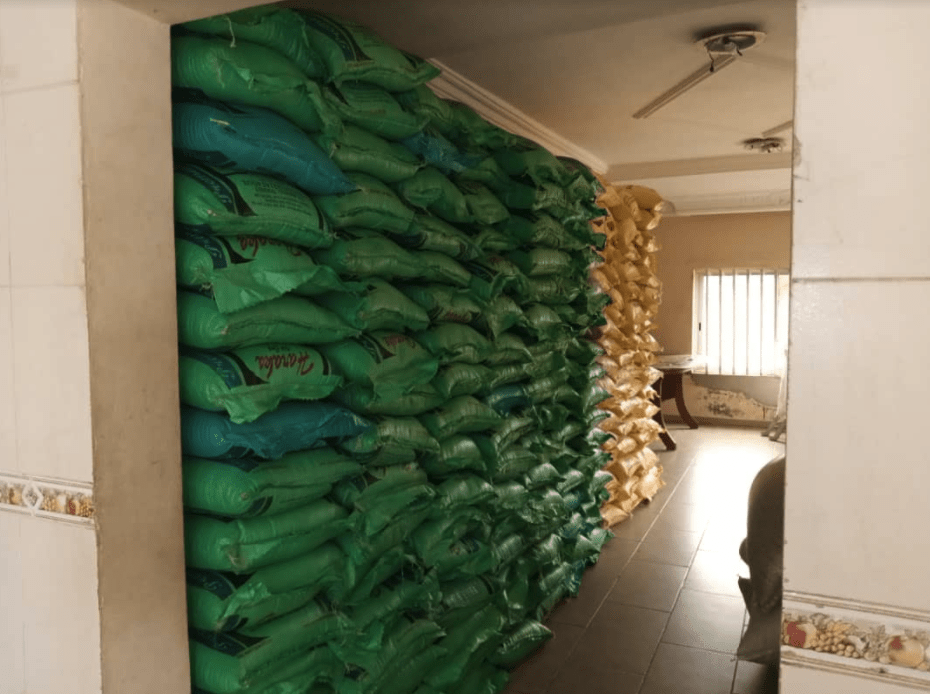
“I thank GAiN for these gifts that [were] sent [to] me,” expressed Jonas Fangla from the Pentecostal Church of Afekpa in Togo. “I really appreciate it. For this love demonstration, my family and I are very grateful for it. May God bless you a lot and the donors also.”
Komlan Gaglo from Baptist Church of Adeta Akorome in Togo said, “I can’t find the right word[s] to thank and bless God for the life of all staff who remembered me and my family during this difficult time, due to the COVID-19. I pray that God bless[es] you more than what you expected.”
The remainder of the PSP was officially wrapped on September 5. To date, a total of 200 pastors in Togo and 475 pastors in Benin have received support. Our prayer is that this project will continue to bear fruit beyond just providing for pastors’ basic needs.
With pastors receiving support, it’s our hope that they were able to reach those believers who stopped attending church due to the impact of the pandemic.
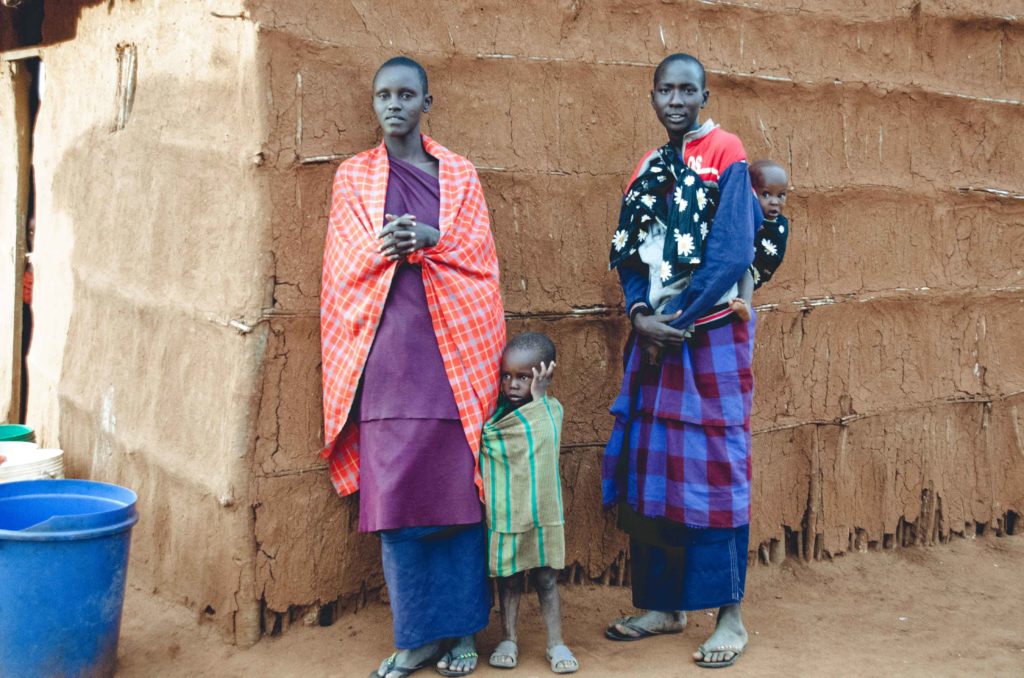
When the world shut down in March 2020 due to the COVID pandemic, GAiN was also forced to pause its Water for Life Initiative drilling operations in Benin, Togo, and Tanzania. Our teams continued to provide hand washing stations and hygiene and sanitation trainings to rural villages in the months that followed. While we had to also pause our church mobilization and multiplication activity, we focused on supporting local pastors with food aid packages to help get them through while churches were closed or attendance was low.
We were thrilled when we were finally able to restart drilling operations by the end of August. Since then, we’ve been able to provide 153 productive wells.
“We bless the Lord and [want to say] a sincere thank you for this [well],” expressed Dieudonné, village chief and farmer of Gbandan Centre, Benin, shared with GAiN in March 2021. “[Before we received our well in February 2017], our suffering was enormous. Today, we have water at all times. The quality of water surpasses the surrounding waters. Hygiene and sanitation training has helped us a lot. Today, COVID-19 has [encouraged] everyone to wash their hands, something that GAiN has taught us long before. The population knows that they must wash their hands regularly.”
Since September, in partnership with local churches, we were also able to plant 39 churches. Following each country’s health and safety guidelines, we stuck to smaller showings of the JESUS film and incorporated more door-to-door evangelism. Despite the restrictions, a total of 21,696 people have attended a JESUS film showing and 3,510 made decisions to follow Jesus. An unexpected upside to the restriction of size gatherings, our team reports, is that people feel more comfortable coming forward to accept Christ when they are in smaller groups.
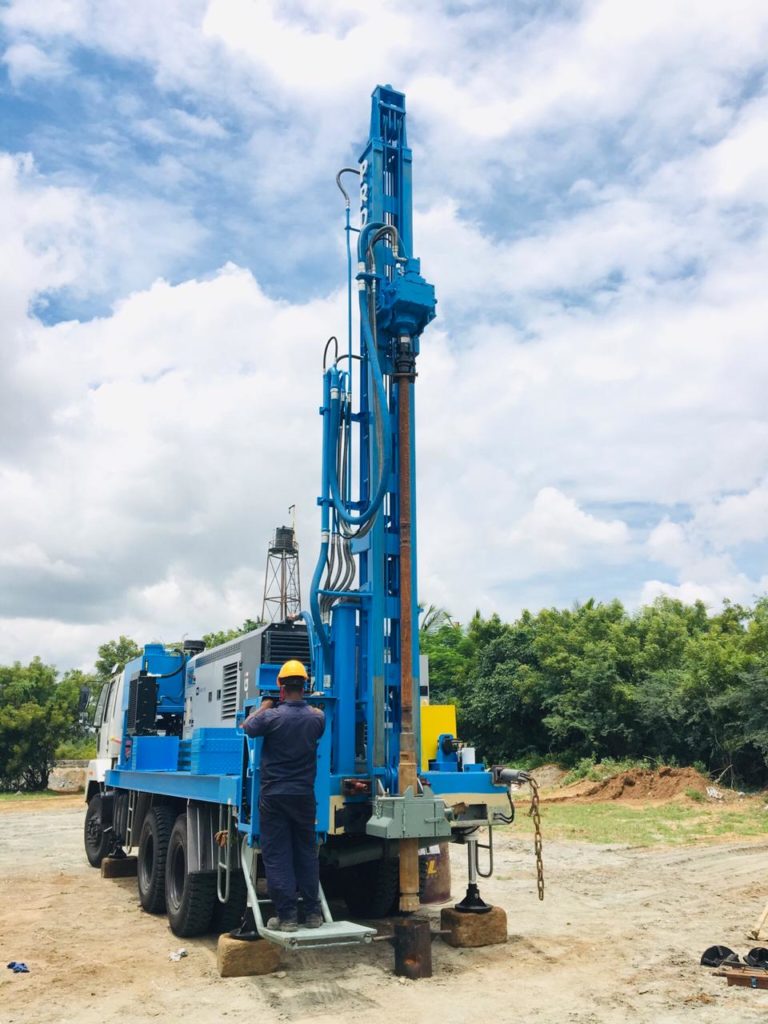
In the past year, two new drilling rigs were donated, one for Tanzania that started operations in September 2020 and one for Benin in April 2021. These rigs are each expected to help provide access to clean water to approximately 70,000 people per year! The rig’s higher drilling capabilities will allow us to drill deeper wells (up to 200 metres) in places where we could not before.
In addition to restarting regular operations, WFLI has also started a few new projects. Recently, we’ve partnered with GAiN Switzerland on a water project in the Maasailand area of Tanzania. This is a new region in the north that we haven’t worked in before.
“This partnership between GAiN Switzerland and GAiN Canada is significant because of the integration of two international GAiN offices (in Switzerland and Canada) who are working together with GAiN Tanzania to reach the Maasai people of northern Tanzania,” Steve J. Thompson, Director for WFLI, explains. “Surface water is very scarce in the Maasailand region, and we’ve needed to go deep into the ground (up to 180 m) to find clean water. Without the partnership of GAiN Switzerland, GAiN Canada, GAiN Tanzania, and Swiss donors, this work would not be possible.”
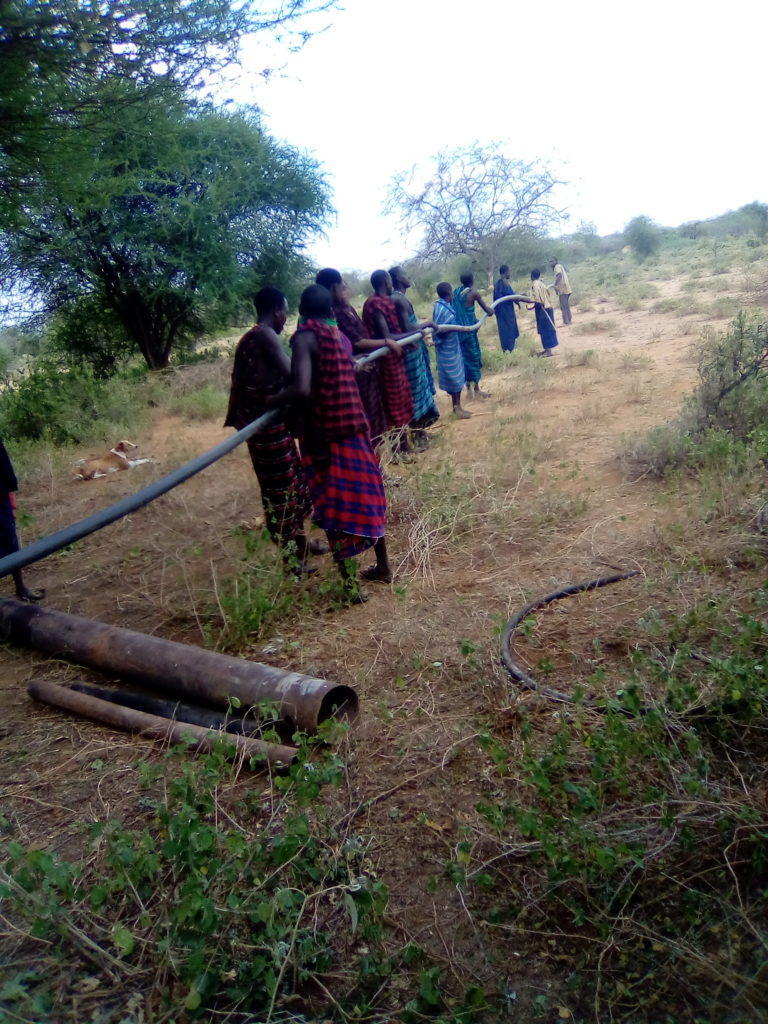
The water wells in this region are deeper than the water wells we drill in the south of Tanzania, requiring submersible pumps and water towers in these villages.
“[This] requires the use of a generator,” Stephanie McDonald, Project Manager for WFLI, explains. “When the generator is switched on, the submersible pump will pump water back into the 3000L water tank. Villagers will be able to get water from the tank by the tap.”
We’ve also started the AFA project in Benin and Tanzania. AFA stands for Anii, Fulfulde and Assa, the three unreached people groups (UPGs)* – two from Benin and one from Tanzania – that we’re focused on reaching over the next three years as part of our church mobilization and multiplication strategy. Project activities have started in March, with our teams surveying villages in the surrounding areas to learn more about the UPGs, in hopes of getting a better understanding of the spiritual climate.
“These questions are important [to ask], first, because it is not always easy to find the people we are trying to reach,” Eric Rose, Mission Integration Director, says. “Sometimes, civil unrest or sickness or famine can cause groups of people to pack up and relocate elsewhere, so making sure we are in the right place is critical.”
Asking the right questions will help our teams learn key information, such as where the majority of the UPG is located, why it is still unreached, the religious or worldviews of the people group, the primary language, and if there are any existing churches among these groups.
Thompson adds, “Through integral mission, we intend to continue to strengthen existing churches, plant new churches, and equip pastors, lay leaders and other members of the community in the methods of discipleship and evangelism. Additional support will be provided to pastors through focused teaching on servant leadership, and the provision of funds to attend seminary to strengthen their Biblical roots. This project demonstrates the integrated body of Christ through our financial partners, local churches and national GAiN staff.”
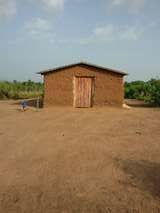
Another exciting project is one in partnership with Pioneers Benin, affiliated with Pioneers International (an international Christian missions organization focused on church planting among UPGs). This project is locally funded.
Thompson shares: “Seventy-five per cent of funds required for this project were raised from local donors in Benin who are partnering with Canadian donors to ensure its success. This shows how the strength of believers across continents and oceans can work together to further God’s Kingdom.”
This project is significant, Thompson says, because it will reach the predominantly Muslim areas of the country. “Many individual attempts to reach this area with the gospel have been repelled, but through our partnership with Pioneers, we are praying that many would respond to the gospel message.”
As the year rolls on, we continue to work toward building a world where human flourishing is restored and water poverty is eradicated through the power of the gospel. With the addition of these new projects, we are excited to expand our reach so that more people can experience whole-life transformation through safe water and the Living Water.
*Unreached people groups, also known as least reached people groups, are “an identifiable group of people distinguished by a distinct culture, language, or social class who lack a community of Christians able to evangelize the rest of the people group without outside help,” according to Global Frontier Missions.
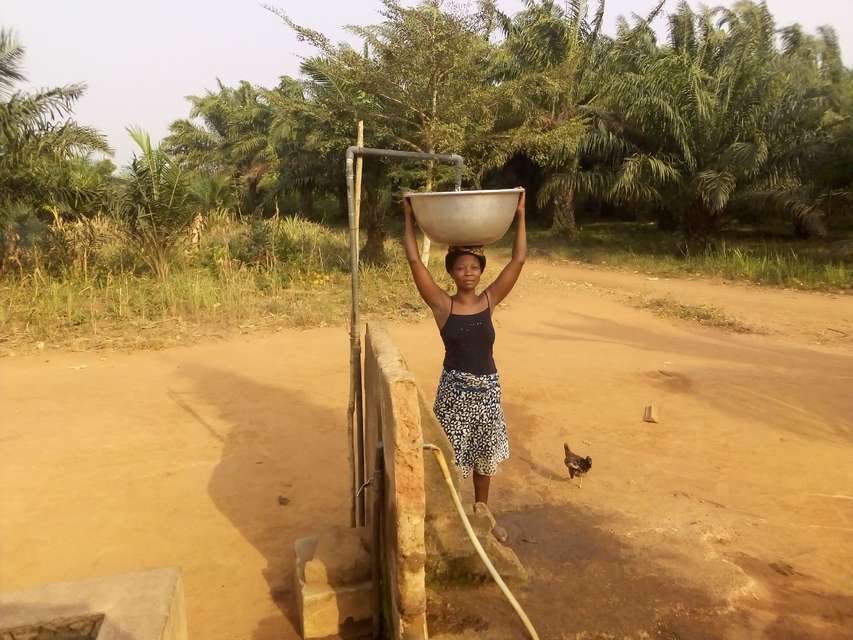
In the village of Adjalagan in South Benin, people were deeply rooted in traditional voodoo. Villagers worked hard and relied on farming activities to sell produce at the local market to make a living, but without water access this was even more difficult. There were no schools, nor opportunities for learning. Hygiene in the village and in homes was poor due to the lack of water. The village was dirty and people were living in darkness and despair.
This all changed when Global Aid Network (GAiN) first got involved in Adjalagan almost 10 years ago, providing a deep-capped water well for 1,400 villagers and supporting a local church to introduce people to the Living Water of Jesus. With access to clean water, people were no longer sick and the cleanliness of the community greatly improved. People were finally able to wash their clothes, and sweep and dispose of garbage properly. Access to clean water gave them dignity and improved the mindset of those who now want to take care of themselves, their families and their homes.
Recently, in January, our team visited the community to monitor the impact of the program, connect with the local church, and assess the sustainability of the water well. The pump was functioning very well and the water committee has been maintaining it and arranging for repairs when necessary. The community continues to maintain cleanliness and good hygiene practices taught in the hygiene and sanitation training.
We were excited to see that the community development trainings have proven effective in maintaining the sustainability of the well. With access to clean water helping to bring peace and lessen quarrels in households and among neighbours, the gender sensitivity trainings also helped contribute to understanding between men and women. A total of forty-six men and women attended the training, improving the overall well-being and quality of life for everyone in the village.
Benedict, a former leader in cult practices in Adjalagan, shared:
“GAiN contributed to other changes in our village. It is because of one of their trainings that I am no longer violent with my wife and it brought peace to our household. So many things have changed in our behaviours. This is important because before we did not understand but now we do, especially as we practice these things. In another GAiN training, we realized that we should go to the clinic for the birth of children. We learned that going to school is important and we began by sending our children to school. Many things have changed in our lives. It is as if we were in darkness and GAiN brought us to the light.”
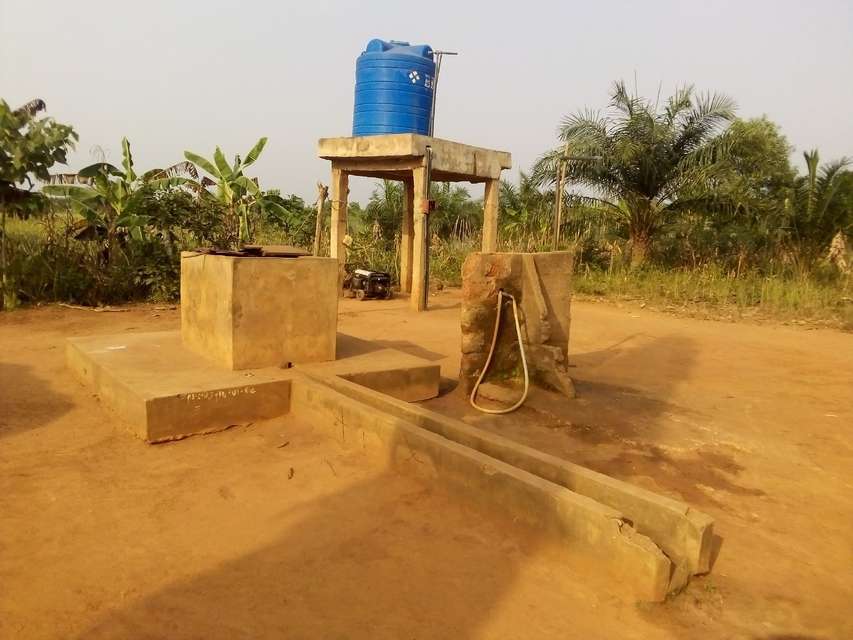
The local church is very engaged in the community and carries the light of Christ to these people. Previously, the villagers were very resistant to the church and tried to force the local pastor to leave. But because of the faithfulness of this pastor and the partnership with GAiN to bring clean water and community development, there is now a thriving church in this community.
Eight years ago, in partnership with the local church, the JESUS film was shown to a total of 405 people in the village, resulting in 114 people making the decision to follow Jesus, and 23 people joining a follow-up group to learn the basics of their new faith. As of January 2021, the local church is attended by over 120 people. People in Adjalagan are no longer interested in practicing Voodoo. Lives have been transformed and people have hope!
For villagers like Benedict, we strive to see a world where a person’s dignity and rights are realized through access to basic water services, while churches actively participate in reversing the cycle of spiritual, physical, social and economic poverty. The COVID-19 pandemic has also demonstrated the critical importance of sanitation, hygiene and adequate access to clean water for preventing and containing diseases.
We are raising $85,000 by June 30 to provide approximately 10,000 villagers in 10 communities with safe water and the Living Water. Would you join us as we help other Benedicts of the world to live out their God-given potential for their lives (John 10:10)? Your donation of $85, $170 or $425 improves, not only family life, but overall quality of life for women, men and children.
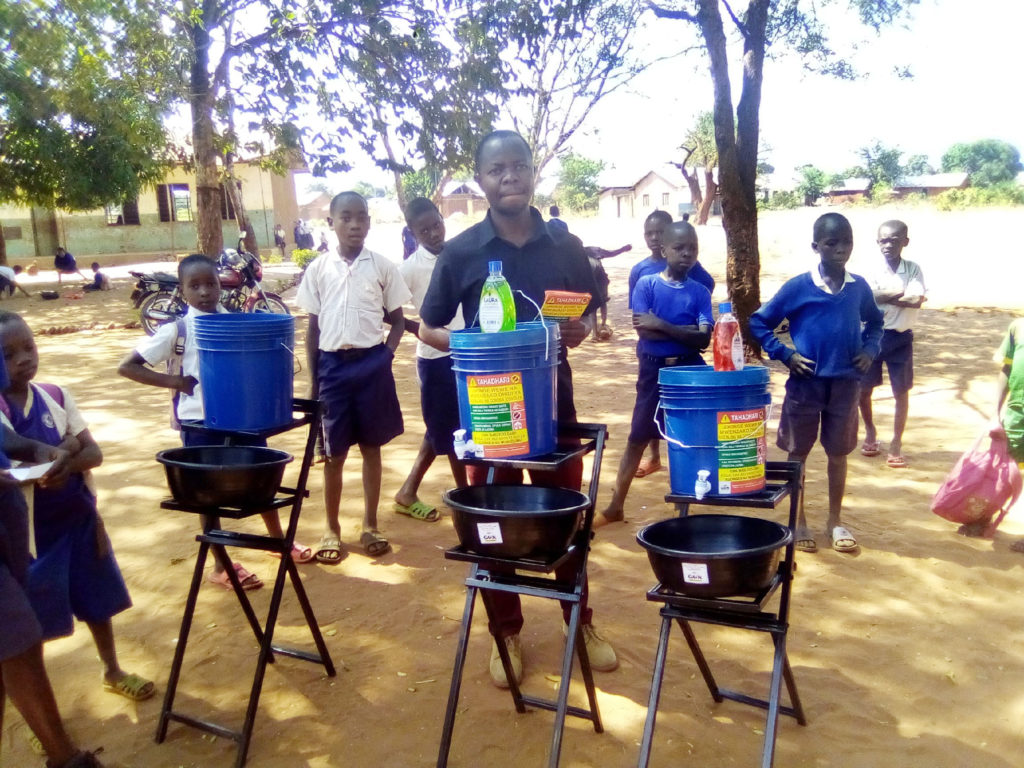
For over a decade, Global Aid Network (GAiN) has been involved in providing deep-capped water wells to rural villages in countries such as Benin, Togo and Tanzania. Along with access to clean water, GAiN focuses on holistic sustainable community development as part of our integrated WASH (Water, Sanitation and Hygiene) program, which includes hygiene and sanitation training.
The importance of hygiene and sanitation is especially highlighted in times like a global pandemic. When COVID-19 spread to Benin, Togo and Tanzania, Global Aid Network (GAiN) pivoted our community strategy, building on our hygiene and sanitation trainings, to raise awareness about COVID-19 prevention through a community response, church response and clinic response.
Each response included sharing health promotion messages such as washing hands with soap and water often, or using hand sanitizer, keeping two metres apart, wearing PPE (personal protective equipment) such as gloves and masks, and staying home when sick. Hand hygiene materials (such as soap and sanitizer) were also distributed to church pastors, clinics and households.
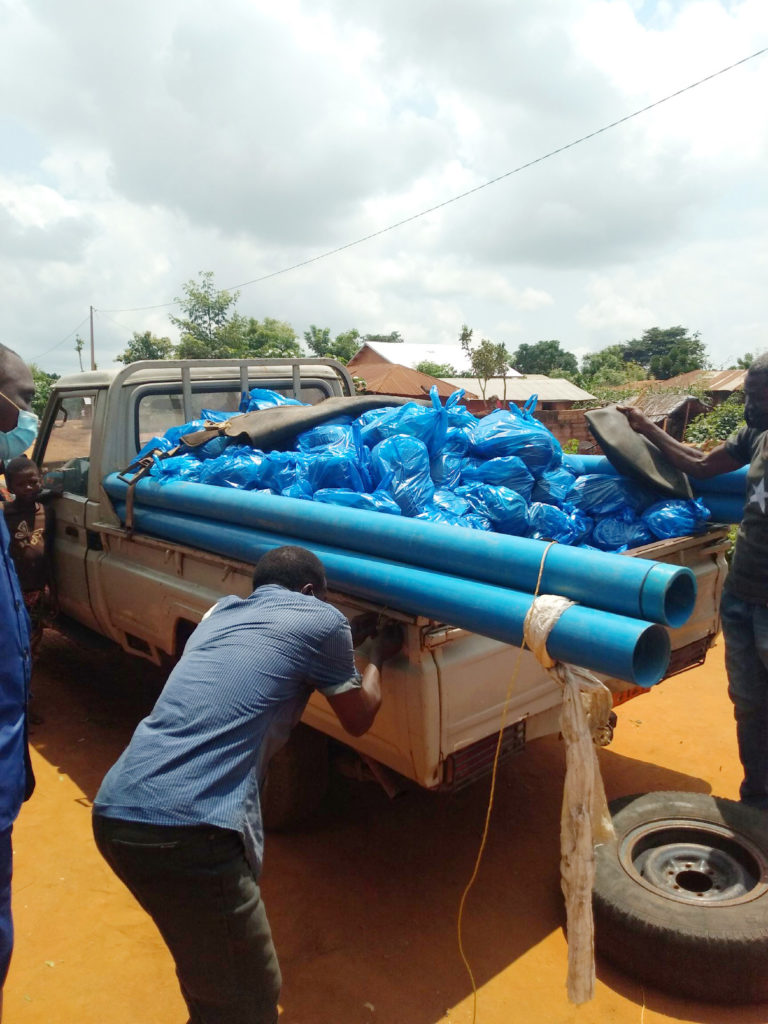
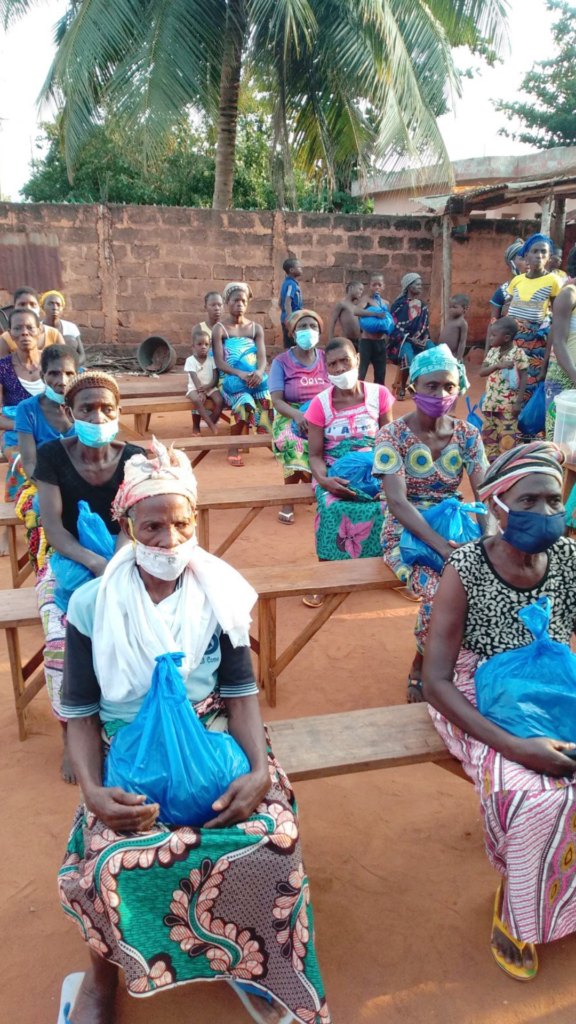
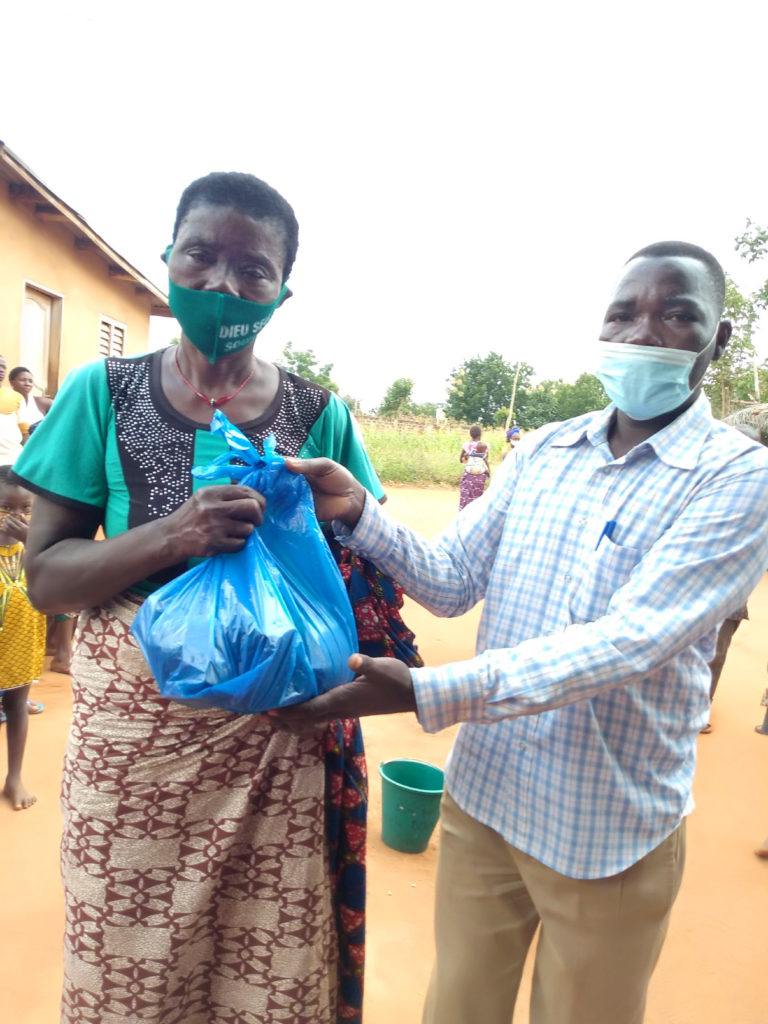
The idea was to empower and equip pastors and clinic workers to not just feel safe, but also spread the message on how to prevent the spread of the virus and encourage members of the community to demonstrate love during the pandemic. GAiN was able to connect with pastors through calling and texting, to offer support coaching.
The community response has been important, especially because many of the villages our teams reached are remote and hard to access. It is essential for villagers to understand the necessary precautions in order to keep their communities safe and healthy. Sharing health messages and distributing hygiene materials was also a good way to share the love of God to people in the village, by showing that their physical health is valued.
When sharing these health messages, teams in the field met with members of the community in small groups. Not only did they share knowledge, but they also modelled proper safety protocols.
In Benin, teams delivered soap to households and local pastors were taught how to encourage villagers to create their own handwashing stations with buckets and soap. Local pastors were equipped with megaphones to reach people with important health messages without needing to host a large group of people together.
“The megaphone will help me share the word of God and continue the promotion of personal protection equipment in the village. With this, my ministry will grow here,” expressed Pastor Dogble Gossou Paul, who leads a local church in Dossohoue, Benin.
He continued, “[The health] promotion is wonderful and I’m pleased, especially the hygiene part of it would [encourage] people here to practice hygiene more. We are in a village here where people don’t understand much about the current COVID-19 disease. So, this will make them knowledgeable and empower them as to [how to] avoid the disease. I’m sure this promotion is a great teaching for the whole village and for the church in particular.”
Pastor Dogble also believes in leading by example for his congregation. “I’ll strictly use everything I’ve learned here in my household, and then I’ll remind it to the church because ‘charity begins at home.’”
Our teams also reached five schools in Tanzania, providing handwashing stations, as well as health messaging. The need for handwashing stations in Tanzania has been even more significant since classes have resumed. Thanks to the handwashing stations, students and teachers can easily wash their hands, and continue to keep safe and lower the risk of contamination.
We are now restarting our drilling operations and excited to continue to bring clean water to communities in need. The pandemic is not over, but we are determined to take the lessons we learned from our COVID response to continue to promote proper hygiene and sanitation practices. There is no doubt that WASH will continue to be a priority when it comes to COVID prevention and as we carry on with the work we’ve started.
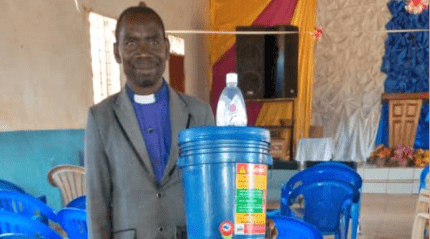
Over the last six months, food insecurity has become an even greater concern in developing countries like Benin, Togo and Tanzania due to the global pandemic. The pastors that we partner with have not been spared the economic consequences, with many of them struggling to put food on the table. Thanks to everyone who supported our COVID response, we were able to provide food to approximately 400 pastors in need, with the last bags of food being provided at the beginning of August.
“This food is going to [feed] a lot of people in my household,” shared Pastor Vivwadinou Edmond from Glo Djitin, Benin. “I have four children, but we have other relatives living with us. We were suffering as a result of the COVID-19 outbreak, but today we are incredibly happy because we have been given some food. We have no other support. God knows that so many pastors are suffering as a result of the COVID-19 crisis. We were totally desperate. We did not know what to do or how the future would look like. We used to get some money at the end of the month; but during this crisis, it is like no months come to their end. Nobody asked how we are managing to survive but God brought us relief.”
Another pastor in Benin, Pastor Adrien Hountekon from Tori Gbohoue, also received help and expressed his gratitude.
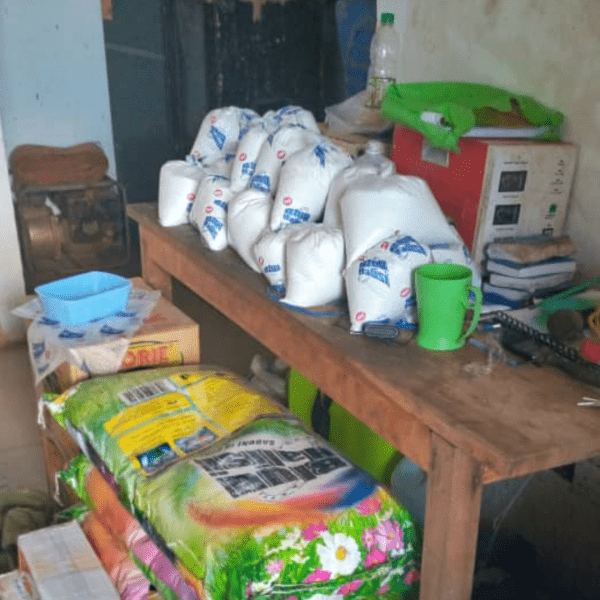
“As a result of COVID-19, churches closed and we pastors are experiencing exceedingly difficult times. Our church members were struggling financially even before the crisis, but as a result of COVID things have become worse. We no more meet for worship services. We attempt to meet in homes but it is difficult. We somehow are trying our best to visit believers in their homes to pray for them or to bring encouragement to them. We all know that it is from what the believers give that pastors are paid and now that we no more hold church services we are in trouble financially. Pastors today lack means to even go and visit church members. Today, I am greatly encouraged as a result of what I have seen and [the food I] received. It has given me energy to continue to work. I have understood that not everybody has forgotten about pastors.”
Thank you for helping reveal hope and restore life to pastors in Benin, Togo and Tanzania. The impact of your support truly goes beyond just providing food. The emotional encouragement of knowing that they are supported and cared for has made a tremendous impact in the lives of pastors who are still working hard in their communities to share the unconditional love of Jesus, and support and encourage their church members during this pandemic.
“The COVID-19 crisis has been very tough for us,” Pastor Pascal, leader of the Assemblies of God church in Gbegbessa, Benin, shared. “We have lacked food and we have not found anybody to come to our support. Hadn’t we had faith in God, we would have abandoned the ministry. Very few church members would ask to know how we were doing and help. We were abandoned to our own.”
The church was planted back in 2010 as part of Global Aid Network’s (GAiN) water and church planting strategy. Villagers received access to both safe water through a deep-capped water well as well as had an opportunity to hear about Jesus. Pastor Pascal, which was from a church in a nearby village (called a mother church), committed to a long commute to this church plant, so that he could invest time in the new church.
“I did a lot of teaching by myself or through a lay leader and was able to baptize a bunch of people there. I have taken care of the church like [I did with] the mother church, being with them on a regular basis.”
In February 2020, the church started an evangelism program, which resulted in increased church attendance. But when COVID-19 hit not too long after, the country implemented restrictions on public gatherings in groups, meaning that church meetings were no longer permitted. Many churches, including the one in Gbegbessa, had to meet in member homes for shorter periods of time and in smaller groups. Eventually, the church in Gbegbessa decided to stop small house meetings and instead have Pastor Pascal go house to house to visit members’ homes on his own.
GAiN has been connecting with pastors in Benin, Togo, and Tanzania during the pandemic, through calling and texting, to offer support and coaching.
The goal is to provide pastors with the tools to help promote health and encouragement to their communities, bringing knowledge and hope. Pastors help spread the message on how to reduce the spread of the virus, as well as provide care for church members and encourage their members to demonstrate love in their communities.
Government restrictions in response to COVID have also heightened food insecurity in these countries. To help alleviate some of the burden, GAiN is providing one to two months worth of food to pastors and their families (approximately 450 pastors in Benin, 200 in Togo and 40 in Tanzania) as part of the Pastor Support Program. Pastor Pascal is one of those pastors.
“Two weeks ago, I received a call from the GAiN people who wanted us to come for a meeting. I was very glad to hear that because I know these people may want to support us in some way. I started to call them on a regular basis to make sure I don’t miss the opportunity,” Pastor Pascal said.
“As I got to the GAiN office, I noticed bags of rice and am happy because I am sure I am going to bring food back home for children, my wife and myself. We will cook food and rejoice. This food will last for many weeks. Everybody in my household will be very happy.”
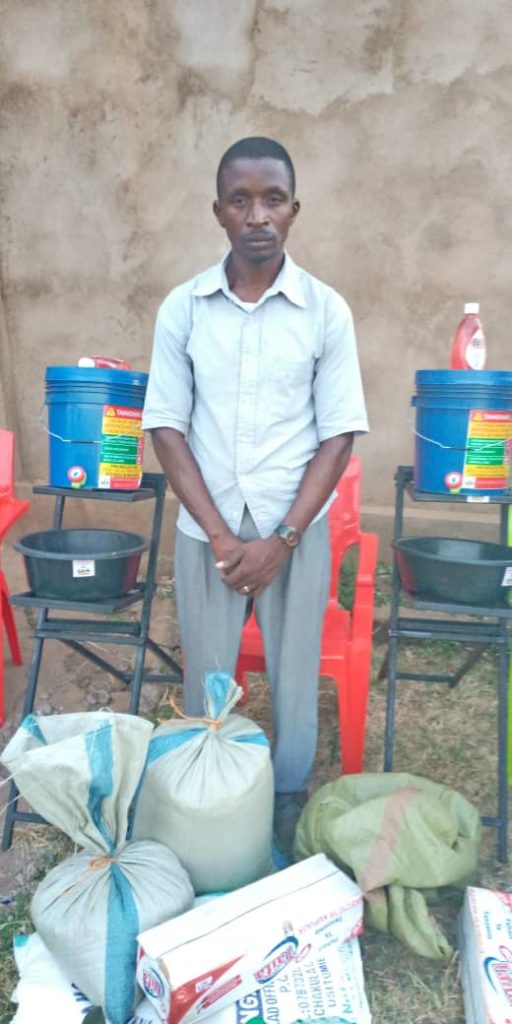
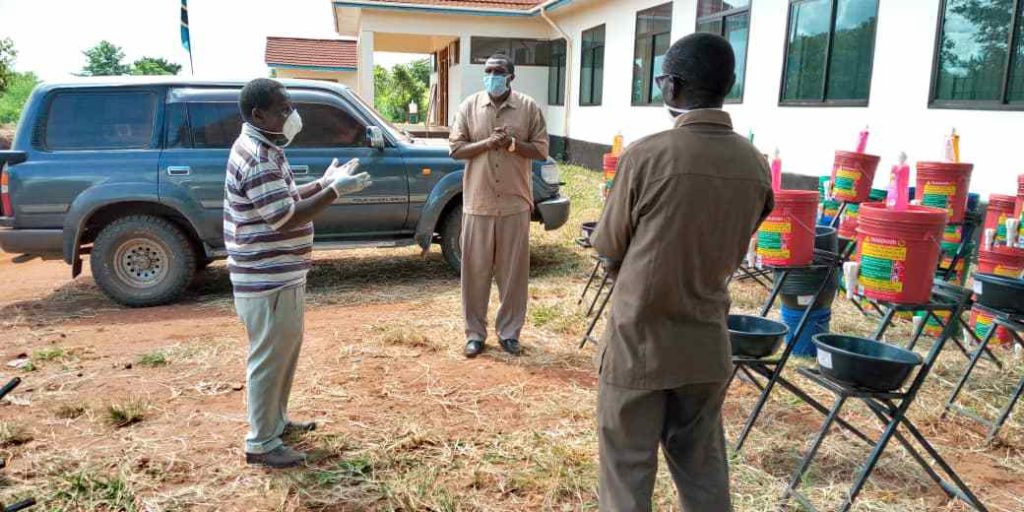
Current State of COVID-19 in Sub-Saharan Africa
With the growing impact of Novel Coronavirus (COVID-19) globally, there are heightened concerns about the fragile state of health and hygiene in Sub-Saharan Africa.
As of May 12, there are over 63,000 total confirmed cases in the African subcontinent and over 2300 deaths1; most cases are found in South Africa, Algeria, and Nigeria at this time. There are confirmed cases in each of our program countries, Benin, Togo, and Tanzania2. While case numbers are currently low, there are many speculations for why that is. It could be due to low testing rate and reporting, it could also be due to warmer temperatures (which affect the spread of similar viruses), it could be due to low levels of urbanization leading people to travel less frequently and therefore have fewer opportunities to come in contact with the virus3. Regardless of the reason, it is clear that with weaker health infrastructure and more limited access to hygiene and water resources that there is cause for concern as numbers continue to increase.
COVID-19 is also starting to affect an increasing number of healthcare workers, so far at least 1000 healthcare workers have been infected, two have been recorded in Benin and one in Tanzania4. There are concerns as this number increases, as the health infrastructure can be fragile and not adequately resourced.
In attempts to slow the spread of the virus, some countries such as Tanzania have begun to take action by banning public gatherings. Togo is among other African nations that have made the decision to close schools and limit access to borders as a precautionary measure. However, many governments have yet to respond to the growing threat.
Potential Impact of COVID-19 in Sub-Saharan Africa
Due to limited access to health and hygiene knowledge and restricted health infrastructure, there is concern over the ability of current health resources to be able to support and provide adequate information and services to the population as confirmed cases of COVID-19 increase. Not only is the response a concern, but this will also divert resources from other important health resources. For example, studies found that during the Ebola outbreak in Sierra Leone that the decreased utilization of reproductive health services led to at least 3600 additional maternal, neonatal and stillbirth deaths in 2014-20155. Limited access to health services and supplies is a consistent concern throughout the region of Sub-Saharan Africa, and definitely in rural Benin, Togo and Tanzania where GAiN operates.
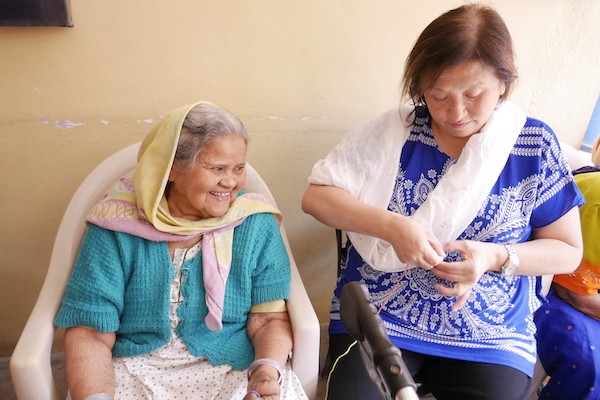
Misinformation in communities is another concern with regards to health information regarding COVID-19. Many rural communities lack basic health literacy and are not adequately connected to health services such as local clinics6. This also leads to communities not being properly informed or believing unhelpful myths. This was an issue in West Africa during the Ebola crisis, where people either did not initially believe or trust health officials and sought information and treatment from improper sources7. It is important that these same mistakes and patterns are not repeated and that communities are engaged with appropriate messaging from reliable sources, and that local leaders are utilised in these efforts.
In Sub-Saharan Africa, 75% of the population has either no access or limited access to handwashing facilities; 61% have access to safely managed or basic water resources, which is also essential to hygiene promotion8. These are concerning figures, especially as handwashing and hygiene promotion are the primary identified ways to prevent exposure to and prevent the spread of COVID-19. In a technical brief released by WHO and UNICEF there were a few pieces of important information highlighted, including frequent and proper hand hygiene, and continued safe management of drinking water and sanitation services. These two principles have many additional benefits to communities including preventing infectious diseases as a whole each year9.
How Handwashing and Hygiene Promotion is Helping Against COVID-19
The World Health Organization (WHO) has consistently said the best way to protect yourself and others from getting sick is to wash your hands with clean water and soap or an alcohol-based rub. According to the Joint Monitoring Programme published in 2019, only 51% of health care facilities in Sub-Saharan Africa had alcohol-based hand rub at points of care and only 64% of non-hospital healthcare facilities had hand hygiene facilities.
The Office of the High Commissioner for Human Rights (UN Human Rights) released a statement on March 23, 2020 stating the COVID-19 will not be stopped without providing safe water to people living in vulnerability10. This statement highlights the need and importance of access to safe water, which is essential to the practice of handwashing, but also the potential harmful implications for communities and people for which access proves more challenging.
What GAiN is doing
For many years, GAiN has been working with rural communities and local health centres in Sub-Saharan Africa to provide clean water and train people on how to effectively manage their hygiene, including handwashing. These valuable resources and skills have developed the preparedness of rural communities to prevent the spread of harmful diseases. Since these WASH interventions, communities have been practicing good hygiene behaviours which has improved their health and hygiene, and has had a ripple effect in surrounding communities.
This work is especially important now, as many underserved rural communities need to be educated and equipped to prevent the spread of dangerous infectious diseases. GAiN works to drill deep-capped borehole wells to provide sustainable access to safe water, then community trainings are facilitated to teach proper hygiene and sanitation practices. This includes essential knowledge about infection prevention and control through germ transmission mapping and effective handwashing practices. These activities work to build community health resilience which enables people to prevent the spread of infectious diseases and withstand the impacts of them within their community.
GAiN’s COVID response so far
As part of GAiN’s COVID response, GAiN has partnered with rural clinics in Benin and Togo that are low on resources, so that they can be better equipped and prepared to handle an outbreak. GAiN had previously worked with these clinics for the Maternal, Newborn and Child Health (MNCH) project in 2017 and 2018.
As of May 2020, GAiN has completed its first round of COVID response. Each clinic received five handwashing stations with soap and water, 100 masks, 100 pairs of gloves and sanitizer fluid.
Workers from clinics that received equipment reported that they felt a greater sense of security, as it helped reduce the risk of contamination for both workers and patients.
“This new equipment is going to serve us to protect all the clinic workers. We will also use the mask as protection to our patients and let everybody that is coming to the clinic to wash their hand properly before having access to the clinic,” Silete, a manager at one of the clinics, said.
Will you partner with us to help reveal hope and restore life through our COVID Response? Together, we can help communities slow the spread of the virus and help empower their communities with knowledge on how to stay safe.
1 https://www.afro.who.int/health-topics/coronavirus-covid-19
2 https://apps.who.int/iris/bitstream/handle/10665/331989/SITREP_COVID-19_WHOAFRO_20200506-eng.pdf
3https://theconversation.com/covid-19-in-africa-fewer-cases-so-far-and-more-preparation-needed-133539
4 https://theconversation.com/covid-19-in-africa-fewer-cases-so-far-and-more-preparation-needed-133539
5https://www.cgdev.org/blog/how-will-covid-19-affect-women-and-girls-low-and-middle-income-countries
6 Nutbeam, Don (2000). “Health literacy as a public health goal: a challenge for contemporary health education and communication strategies into the 21st strategy.” Health Promotion International 15(3), 259-267
7 https://www.odi.org/blogs/16779-covid-19-five-lessons-ebola
8http://washdata.org
9 WHO and Unicef (2020). “Water, sanitation, hygiene and waste management for the COVID-19 virus.” Technical Brief.
10https://www.ohchr.org/EN/NewsEvents/Pages/DisplayNews.aspx?NewsID=25738&LangID=E
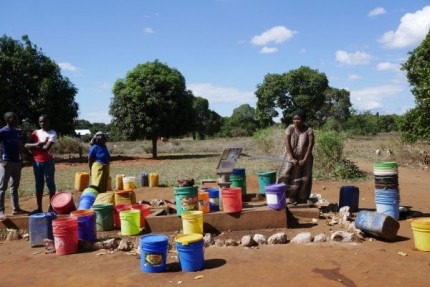
Water is a hot commodity in the village of Nangumbu B in southern Tanzania. Recently, Global Aid Network (GAiN) provided a deep-capped water well to this community and the village is putting it to good use. The water point is constantly buzzing with people coming to fill buckets from their homes, schools and places of work. It has become the center of activity in the village and at peak times, the well draws great crowds.
While people wait in line they talk and share about their families and their days at work. Some of the women of Nangumbu B cleverly decided to take advantage of this new hub and set up a small stand next to the well to sell tomatoes and other local produce. Now, as people are waiting for water, they can shop at this mini market.
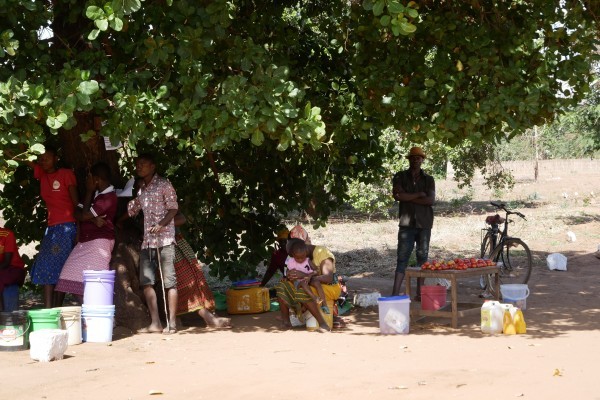
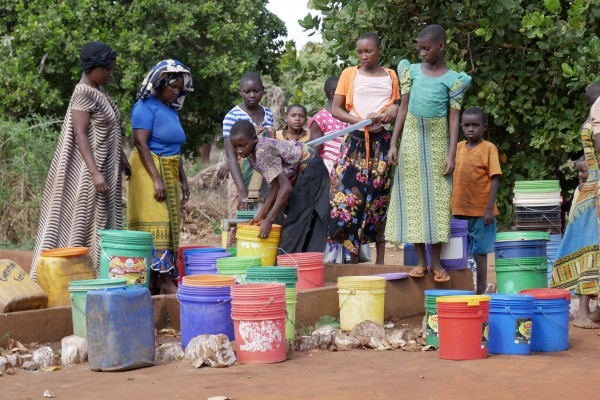
The convenient location and in-demand stock has led to a thriving business for these women and they are making good sales. These smart business women are hoping to grow their stand and provide more options to the people. The water point is evolving into an economic and social hub, enabling safe use of clean water while promoting local businesses, furthering the wholistic development of this community.
As economic opportunities continue to grow in Nangumbu B, so does the local church. Since the provision of the well, five JESUS film showings have taken place in the village. A total of 1,574 people attended the showings and, after seeing the film, 83 people made the decision to become followers of Jesus and attend a follow up. In May 2019, a new church was planted in the village, giving these new believers a new place to gather for worship and grow in their faith.
WERE YOU ENCOURAGED BY THIS STORY? SHARE THE STORY AND/OR LEAVE A COMMENT BELOW!
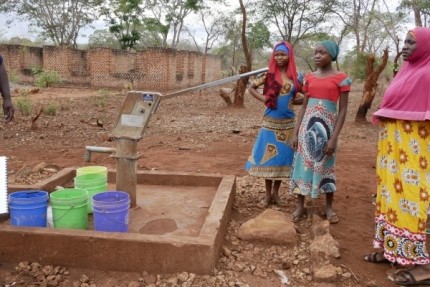
The GAiN Tanzania team recently drilled a well in the village of Liugulu on the grounds of a secondary school where a number of students live during the school year. When we came to visit, we were greeted by a few students.
Lack of clean and safe water affects the education of many students who spend plenty of hours a week collecting water. Unfortunately, this isn’t uncommon. According to UNICEF, one out of every six secondary schools have no drinking water service. 1
Before the well was provided to Liugulu in May 2019, their nearest water source was a small river a few kilometres away. Students had no choice but to fetch buckets of water in the early morning hours or late at night, to ensure that they did not miss classes.
Not only did collecting water take up much of their time, the water was contaminated and often caused them to fall ill, resulting in absences due to sickness. Sadly, up to 443 million school days are missed worldwide, each year, due to water-related illness. 2
But now, with a water source right next to their school, these students are able to enjoy the full health benefits of clean water and the freedom to attend classes and focus on their studies without worrying about the burden of funding water.
We had the opportunity to speak with these students about what dreams they had for the future. Some wanted to be doctors to help heal the sick, while others wanted to be police officers to help protect people.
One girl said she wanted to be a teacher. Her desire was to come back to teach at this school because of the positive impact it has had on her life. Having access to this water source removes a significant barrier for these students to realize their potential. They are now one step closer to seeing their dreams become reality.
1 UNICEF https://www.unicef.org/eap/wash-schools-fast-facts
2 Human Development Report, 2006 https://www.wateraid.org/facts-and-statistics

